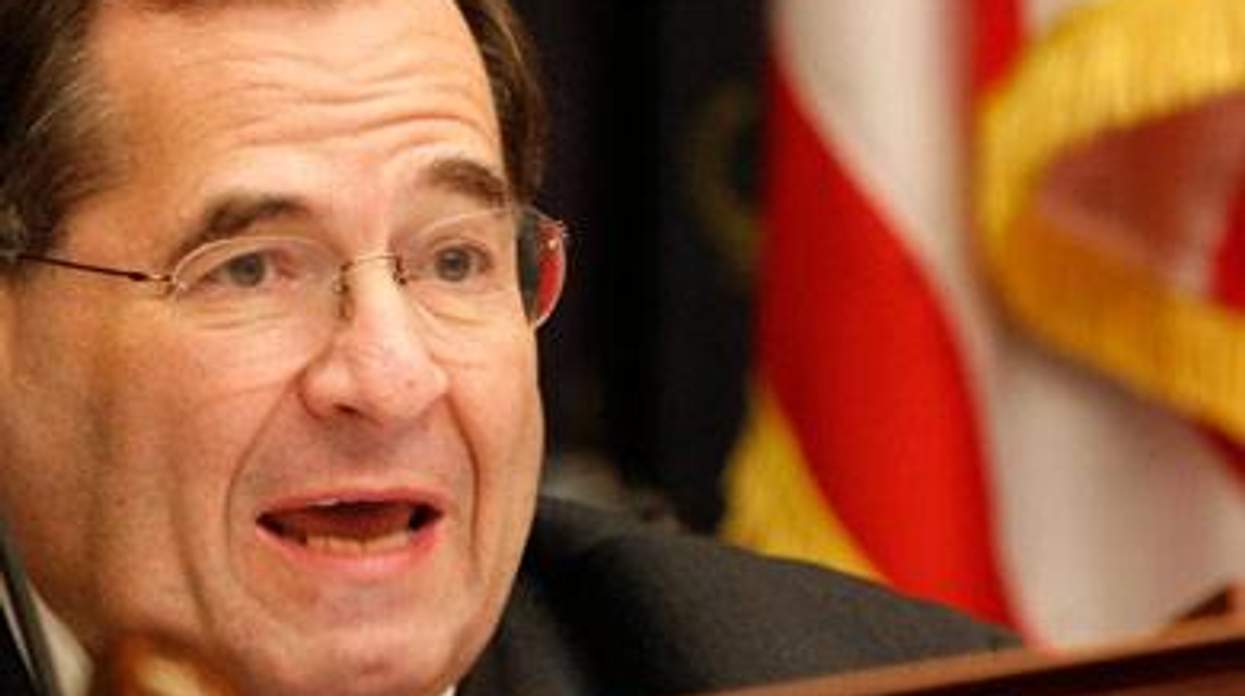Rep. Jerrold
Nadler reintroduced in the House Thursday the Uniting
American Families Act, which would amend current immigration
law to allow gay and lesbian Americans to sponsor
their foreign-born partners for permanent residency on
the same basis that straight citizens can sponsor
spouses.
"The idea
behind the bill is that it is wanton cruelty, gratuitous
cruelty, to keep people who love each other apart,"
Representative Nadler said on a press call with
reporters. The legislation would stipulate that the
word "spouse" be replaced by the term
"permanent partner" wherever it appears
in the Immigration and Nationality Act. No same-sex partner,
whether they are legally married or not, can currently apply
for expedited residency.
Representative
Nadler, a New York Democrat, has introduced a version of
the bill every legislative session since 2000; last session
it had 119 cosponsors, falling 100 votes shy of the
219 it needs to pass in the House.
But
Representative Nadler noted the bill has a fresh new start
with the Democratically controlled Congress and a
president who supports immigration rights for gay and
lesbian couples. "For the first time we are
going to make a really serious attempt to pass this,"
he said, adding that although they are starting out
with 74 cosponsors, he anticipates "far
surpassing" that number within just a couple weeks.
Votes, of course,
sometimes follow the leadership, which is where the
LGBT advocacy organization Immigration Equality is targeting
its lobbying efforts.
"We've come to focus less on the absolute
number than on building support in the key committees
that the bill depends on to move forward,"
executive director Rachel B. Tiven told The
Advocate, "so really focusing on the judiciary
committee in the Senate and the immigration
subcommittee of the judiciary in the House."
Representative
Nadler said he was getting "positive signals from key
members" of the chamber's immigration
subcommittee.
"We hope
it can progress this year and perhaps be folded into the
omnibus immigration, which we expect to enact during
the next Congress," he said. Asked whether the
legislation had a better chance of passing as a
stand-alone measure or perhaps being folded into the larger
immigration bill, Nadler said it was too early to
tell.
"We
won't really know until negotiations start on that
bill in earnest," he said of the larger
immigration package. "I don't know what the
chances are of a comprehensive bill passing right now.
We're going to have to make that tactical
judgment going forward."
In an effort to
build support for UAFA, Immigration Equality recently
hired a policy director, Julie Kruse, who is now based in
Washington, D.C. The organization also met with the
Obama transition team and, although Tiven said they
were in "listening mode," she added that they
were "very knowledgeable about the extra challenges
LGBT immigrants and their families have to contend
with."
Sissi Loftin and
Janet of Brattleboro, Vt., is one such couple. Though
they were joined in a civil union in 2000 and May
will mark their 25th anniversary, they will not be
able to celebrate together. "The Constitution
guarantees us life, liberty, and the pursuit of happiness,
and this really affects my happiness," Loftin said of
their forced separation.
Janet, a British
citizen whose last name has been omitted to protect her
identity, said the situation makes her angry and depressed
at times. "The only way I can be here at the
moment is on a tourist visa, with a maximum of 90
days," she said. "The rest of the time I go
back to England and I feel like I'm living in
exile, waiting for my life to happen."
Tiven said the
estimated 37,000 gay binational couples
affected nationwide are not looking for any
loopholes in the immigration system -- they
simply want the opportunity to meet the same standard
of proof that straight couples meet, of which a marriage
certificate is just one element.
"You go
through a whole process in which you show documentation,
you're interviewed, and you're proving
that you are a bona fide couple and this is not a
marriage of convenience," Tiven explained.
"Our couples would love the opportunity to show
the leases and the mortgages, the joint bank accounts,
the children they're raising, the vacations, and all
the kinds of documentation people have when
they've made a life together."
At least 19
countries currently allow lesbian and gay residents to
sponsor permanent partners for legal immigration, including
Australia, Belgium, Brazil, Canada, Denmark, Finland,
France, Germany, Iceland, Israel, the Netherlands, New
Zealand, Norway, Portugal, South Africa, Spain,
Sweden, Switzerland, and the United Kingdom.
Sen. Patrick
Leahy of Vermont, Democratic chairman of the judiciary
committee, introduced a companion bill in the Senate. It had
19 cosponsors last session and will require at least
60 votes to overcome a filibuster.



































































Charlie Kirk DID say stoning gay people was the 'perfect law' — and these other heinous quotes